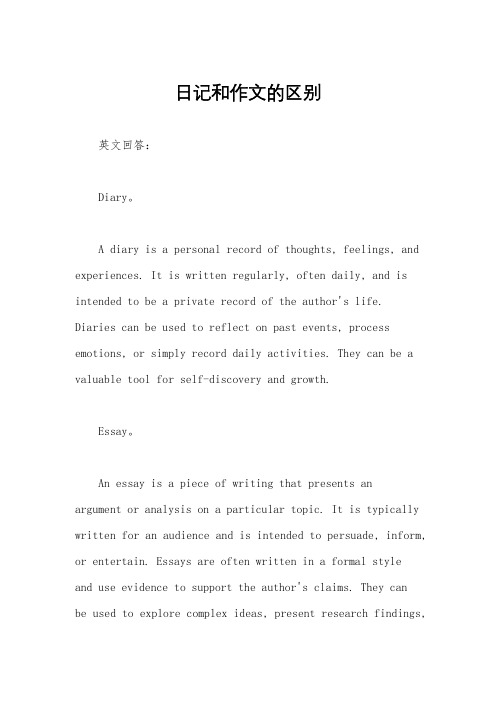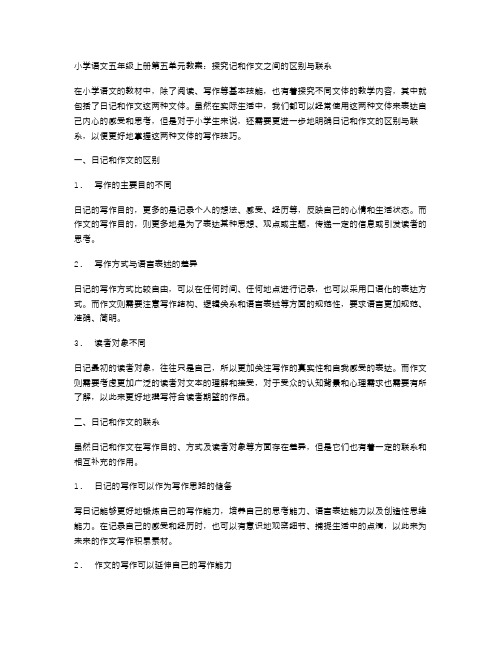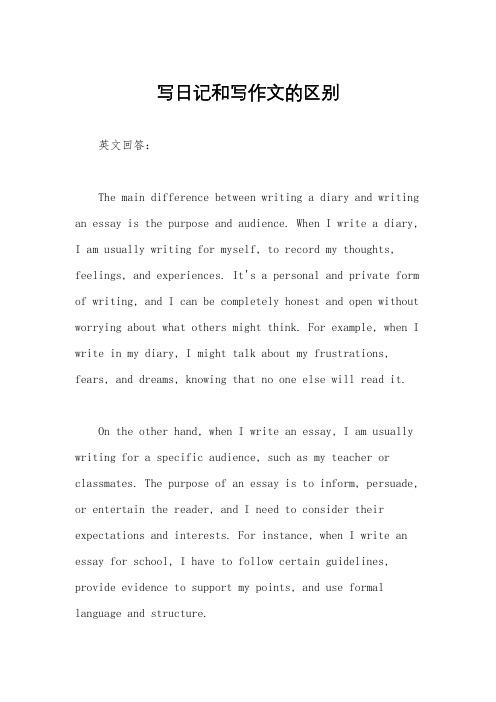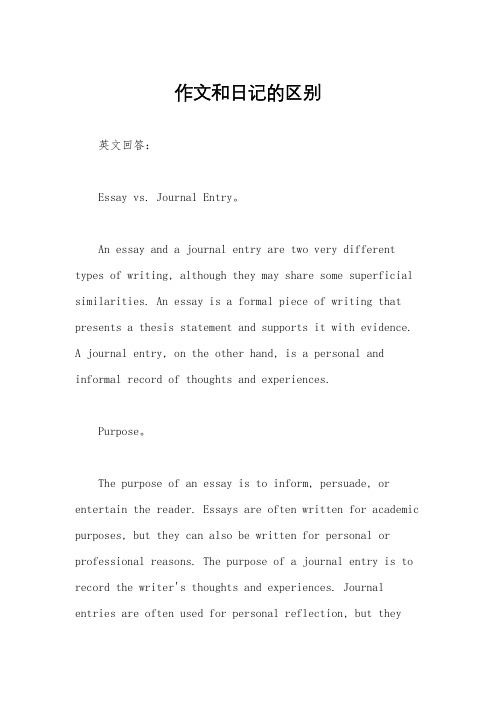作文与日记的区别
2018年部编新人教版三年级上册语文第二单习作《写日记》

日记与作文的区别 (1)格式不一样:日记的第 一行要写上某月某日、星期 几以及天气情况,然后再写 正文。 (2)日记一定是写当天发生 的事情。
日记
内容:一天中所见、所闻、 所做、所想。 选材:新鲜有趣、有意思。 格式:日期、星期几、天气 情况。
9 月11日
星期日
晴
请你以《吹泡泡》这 件趣事,仿照例文写 一篇日记,注意日记 的格式哦!
《学写日记》
这些泡泡各有各的颜色,真是( 五彩缤纷 )
这些泡泡各有各个顽皮的小精灵
像一串串晶莹剔透的葡萄 像一串串香甜的冰糖葫芦
像一群群五彩斑斓的花蝴蝶 像一把把可爱的小降落伞
像钻石那么闪亮 像水晶那么透明 像珍珠那么圆润
日记,就是记 下一天中发生在自 己周围的事,也可 以记下自己在某一 方面的收获、体会。
日记和作文有什么区别

日记和作文有什么区别
日记和作文是两种不同的文体,它们在写作目的、形式和内容方面都有着明显的区别。
下面我将从这三个方面来详细比较日记和作文的不同之处。
首先,日记和作文在写作目的上有着明显的区别。
日记是一种记录个人生活、情感和思想的文体,它的写作目的是为了记录自己的生活点滴,表达内心的情感和思想。
而作文则是一种对某一主题或问题进行阐述、分析和论证的文体,它的写作目的是为了向读者传达作者对某一问题的观点和看法,或者是为了向读者展示作者的写作技巧和思维能力。
其次,日记和作文在形式上也有着显著的区别。
日记通常是以第一人称的方式进行写作,内容较为私密,语言较为随意,常常包括对某一天生活的描述、对某一事件的感受和思考,以及对自己内心的倾诉。
而作文则是以客观、理性的方式进行写作,语言较为正式,内容较为客观,通常包括引言、正文和结论三部分,以及对某一主题或问题的论述和分析。
最后,日记和作文在内容上也存在着明显的区别。
日记的内容主要是作者个人的生活、情感和思想,通常是以时间顺序进行排列,内容较为随意,没有固定的结构和格式。
而作文的内容则是围绕某一主题或问题展开,通常是以论述、分析和论证的方式进行呈现,内容较为严谨,有着明确的结构和格式要求。
综上所述,日记和作文在写作目的、形式和内容方面都有着显著的区别。
日记是一种记录个人生活、情感和思想的文体,形式较为私密,内容较为随意;而作文是一种对某一主题或问题进行阐述、分析和论证的文体,形式较为客观,内容较为严谨。
因此,我们在写作时要根据不同的写作目的和要求选择合适的文体,以便更好地表达自己的思想和情感,达到写作的目的。
英语作文和英语日记的区别

英语作文和英语日记的区别In understanding the differences between an English essay and an English diary, it's essential to grasp their distinctive purposes, structures, and styles.1. Purpose:English Essay: The primary purpose of an English essay is to inform, persuade, or entertain the reader on a specific topic. Essays often aim to convey a central thesis or argument supported by evidence and analysis. They are typically written for a broader audience and often follow a formal or semi-formal tone.English Diary: On the other hand, an English diary serves as a personal record of one's thoughts, experiences, and reflections. Its purpose is more introspective, allowing the writer to express feelings, document daily events, and track personal growth. Diaries are usually written for oneself, though they may occasionally be sharedwith others.2. Structure:English Essay: Essays generally follow a structured format, including an introduction, body paragraphs, and a conclusion. The introduction sets the stage by presenting the topic and the writer's thesis statement. Body paragraphs develop the thesis through supporting evidence and analysis. The conclusion summarizes the main points and reinforces the thesis. Essays often adhere to specific essay types, such as argumentative, narrative, or descriptive, each with its own structural conventions.English Diary: Diaries typically lack a rigid structure and can vary widely in format. Entries may be organized by date or by topic, depending on the writer's preference. There are no strict rules governing diary entries, allowing for greater flexibility and spontaneity in expression. Writers may include stream-of-consciousness reflections, anecdotes, observations, or even sketches.3. Style:English Essay: Essays demand a formal or semi-formal style, characterized by clarity, coherence, and precision. Writers should use proper grammar, syntax, and vocabulary suited to the intended audience and purpose. Whilecreativity and voice are valued, essays generally avoid colloquialisms, slang, or overly casual language.English Diary: Diaries offer a more informal and intimate style, reflecting the writer's individual voice and personality. Writers have the freedom to experiment with language, tone, and style, as there are no strict conventions to adhere to. Diaries often contain colloquialisms, personal anecdotes, emotional expressions, and spontaneous thoughts, creating a sense of authenticity and immediacy.4. Audience:English Essay: Essays are typically written for a broader audience, ranging from instructors and peers to thegeneral public, depending on the context. Writers must consider the knowledge, interests, and expectations oftheir audience when crafting their essays, aiming to engage and persuade readers effectively.English Diary: Diaries are primarily written for the writer themselves, serving as a private space for self-expression and reflection. While some diaries may be shared with trusted friends or family members, the primary audience remains the writer. As such, writers have the freedom to be more candid and unfiltered in their diary entries, without concern for external judgment.In summary, while both English essays and English diaries involve written expression in the English language, they serve distinct purposes, follow different structures, styles, and cater to different audiences. Essays aim to inform, persuade, or entertain a broader audience through structured arguments, while diaries provide a personal record of thoughts and experiences for the writer's own reflection and self-expression.。
作文和日记的区别

作文和日记的区别作文和日记是我们在学习和生活中经常接触到的两种文体,它们在写作目的、写作形式、写作对象等方面都有着明显的不同。
下面就让我们来探讨一下作文和日记的区别。
首先,作文和日记在写作目的上有所区别。
作文是一种具有一定主题和目的的文章,它通常是为了表达作者的观点、观念或者是为了向读者传递某种信息。
作文的目的是为了让读者理解作者的观点,或者是为了让读者对某个问题有所思考。
而日记则是一种记录个人生活的文字,它的目的是为了记录作者的生活经历、感受和情绪。
日记的写作目的是为了让作者能够通过文字记录下自己的生活,或者是为了让作者能够通过文字表达自己的情感。
其次,作文和日记在写作形式上也有所不同。
作文通常是以议论文、说明文、记叙文、议论文等形式出现,它的结构和内容都是经过精心设计和构思的。
作文的语言通常是严谨、正式的,它要求作者要用逻辑思维和丰富的语言表达能力来表达自己的观点。
而日记则是以记叙文的形式出现,它的结构和内容通常是比较自然和随意的。
日记的语言通常是真实、自然的,它要求作者要用真实的语言来记录自己的生活和情感。
最后,作文和日记在写作对象上也有所不同。
作文的写作对象通常是广大读者群体,它的目的是为了向读者传递某种信息或者是为了让读者对某个问题有所思考。
作文的写作对象是比较抽象和广泛的。
而日记的写作对象则是作者自己,它的目的是为了让作者能够通过文字记录下自己的生活,或者是为了让作者能够通过文字表达自己的情感。
日记的写作对象是比较具体和个人的。
综上所述,作文和日记在写作目的、写作形式、写作对象等方面都有着明显的不同。
作文是一种具有一定主题和目的的文章,它通常是为了表达作者的观点、观念或者是为了向读者传递某种信息。
而日记则是一种记录个人生活的文字,它的目的是为了记录作者的生活经历、感受和情绪。
作文的形式和内容是经过精心设计和构思的,它的语言通常是严谨、正式的,写作对象是广大读者群体。
而日记的形式和内容通常是比较自然和随意的,它的语言通常是真实、自然的,写作对象是作者自己。
作文与日记有什么区别

作文与日记有什么区别英文回答:The main difference between an essay and a diary is the purpose and audience. An essay is a formal piece of writing that is intended to be read by a wider audience, while a diary is a personal record of one's thoughts and experiences. 。
In an essay, the writer presents a coherent and organized argument or discussion on a particular topic. The language used is formal and the structure is often divided into introduction, body, and conclusion. The writer aims to convey information or persuade the reader to agree with their point of view. For example, in an essay about climate change, the writer may present scientific evidence and analysis to support their argument.On the other hand, a diary is a personal record ofdaily events, thoughts, and feelings. The language used ismore informal and the structure is often free-flowing. A diary is not written with the intention of being read by others, so the writer can be more honest and open abouttheir emotions and experiences. For example, in a diary entry, the writer may reflect on their day, express their frustrations, or document significant moments in their life.中文回答:作文与日记的主要区别在于目的和受众。
日记与作文的区别

日记与作文的区别文章作者: 佚名 |时间:2012-02-06 |阅读量:390 来源:中国作文网日记与作文的区别作文是一个总称,是指学生学习写作文章,所以叫作文。
中小学生的作文主要有四大类:记叙文、说明文、议论文、应用文。
其中,应用文的范围非常广,中小学生常用的应用文主要包括:倡议书、慰问信、演讲稿、书信、日记等等。
应用文有一个共同的特点,即:每一种应用文体都有自己特有的格式。
例如,书信有书信的格式,请假条有请假条的格式。
同样,日记也有自己的格式,这就是要在每篇日记的前面写上日期、星期、天气等。
另外,日记还有一个与众不同的特点:它是写给自己看的。
其他的文章可以说都是写给别人看的,只有日记是记录自己每天的所见所闻所思,写给自己看的。
因此,要写上日期、星期、天气等,以备今后查看。
日记在具体写作上,是非常灵活的。
比如,可以记叙--记录今天的所见所闻,或记录今天发生的某一件事;可以议论--记录自己的心得体会,或者人生感悟,或者表示自己对某个问题的看法等等。
因此可以说,在具体内容的写作上,日记与一般的记叙文、议论文没有太大的区别。
日记主要记录一天内发生的事或思想变化,比较随意,可以是一个主题,也可以是多个主题,甚至是没有主题的自已对自己的唠叨,结构松散,有想到哪说到哪的随便,口水话比较多.。
作文不一样。
作文就是做文章,有固定的主题,与主题相适应的结构和表达方式,行文严谨。
当然,作为小学生的日记,主要要把握好三条:一是要注意格式。
二是要与今天有关,即要与日记上标明的日期相关,例如记录今天发生的一件事,或今天想到一点心得体会等。
三是要短小精悍,要注意突出重点,防止写成流水账。
作文与日记的区别课标中要求二年级开始学着写周记,到了三年级才有了写作文的要求。
初学写作时,孩子们分不清作文和日记的区别,只知道老师要求要写一篇周记或作文,可他却不知道怎样才算是周记而怎么样又是作文。
现在我归纳了这样几点,仅供参考:一是格式。
日记跟作文有什么不同

日记跟作文有什么不同英文回答:Diary and essay are two different forms of writing. A diary is a personal record of one's thoughts, feelings, and experiences, usually written on a daily basis. It is more informal and often includes personal reflections and emotions. For example, in my diary, I might write about my day, my feelings, and my interactions with others. It's a place where I can be completely honest and open about my thoughts and experiences.On the other hand, an essay is a more formal piece of writing that presents and supports an argument or discusses a topic. It follows a specific structure, with an introduction, body paragraphs, and a conclusion. Essays are often written for a specific audience and purpose, and they require research and evidence to support the points being made. For instance, in an essay, I might write about the causes and effects of climate change, providing evidenceand analysis to support my argument.中文回答:日记和作文是两种不同的写作形式。
作文和日记有什么区别

作文和日记有什么区别
作文和日记是两种不同的文体,它们在形式、内容和目的上都有不同的特点。
作文是一种文学作品,它是作者对某一主题或问题进行思考和表达的产物,具有一定的文学性和艺术性。
而日记则是一种个人记录生活的方式,它是作者对自己生活的点滴进行记录和反思的产物,具有一定的真实性和私密性。
下面我将从形式、内容和目的三个方面来分析作文和日记的区别。
首先,从形式上看,作文通常具有一定的结构和格式,如开头、中间和结尾,
有时还需要有标题和段落。
而日记则没有固定的结构和格式,可以随意书写,可以是连续的文字,也可以是碎片化的记录。
作文通常是用较正式的语言进行表达,而日记则可以是用口语化的语言进行记录。
其次,从内容上看,作文通常是对某一主题或问题进行深入的思考和表达,可
以是议论文、记叙文、说明文等不同的文体。
而日记则是对自己生活的点滴进行记录和反思,可以是对某一事件或情感的描述,也可以是对自己的情绪和心情的表达。
最后,从目的上看,作文通常是为了表达作者对某一问题的观点和看法,可以
是为了说服读者、感染读者或者启发读者。
而日记则是为了记录自己的生活和情感,可以是为了纪念或者排解情绪。
总的来说,作文和日记是两种不同的文体,它们在形式、内容和目的上都有不
同的特点。
作文是一种文学作品,具有一定的文学性和艺术性;而日记则是一种个人记录生活的方式,具有一定的真实性和私密性。
作文和日记各有其特点,各有其用途,我们可以根据自己的需要和目的来选择适合的方式来进行表达和记录。
日记和作文的区别

日记和作文的区别
日记和作文是两种不同的文体,它们在写作目的、写作方式和
表达形式上都有着明显的区别。
首先,日记是一种记录个人生活、情感和思想的文体,其目的
在于记录和反思个人的日常生活,表达个人的情感和感受。
而作文
则是一种以议论、说明、叙述等方式表达作者观点和情感的文体,
其目的在于传达作者对特定主题的看法和观点,或者讲述一个故事,表达一种情感。
其次,日记的写作方式更注重真实性和个人性化,通常采用第
一人称,用简洁、真实的语言记录自己的所见所闻、所思所感。
而
作文的写作方式更注重逻辑性和条理性,通常采用客观、理性的语
言进行说明、分析和论证,以达到说服读者的目的。
再次,日记的表达形式更为随意和自由,可以是一篇连续的文字,也可以是一些碎碎念,或者是一些心情随笔。
而作文的表达形
式更为规范和统一,通常包括开头、中间和结尾,有明确的段落结
构和逻辑关系。
总的来说,日记和作文在写作目的、写作方式和表达形式上都有着明显的区别。
日记是一种记录个人生活、情感和思想的文体,更注重真实性和个人性化;而作文是一种以议论、说明、叙述等方式表达作者观点和情感的文体,更注重逻辑性和条理性。
希望通过本文的介绍,读者能够更加清晰地理解日记和作文的区别,从而在写作时能够更加准确地把握文体特点,提高写作水平。
日记和作文的区别

日记和作文的区别英文回答:Diary。
A diary is a personal record of thoughts, feelings, and experiences. It is written regularly, often daily, and is intended to be a private record of the author's life.Diaries can be used to reflect on past events, process emotions, or simply record daily activities. They can be a valuable tool for self-discovery and growth.Essay。
An essay is a piece of writing that presents an argument or analysis on a particular topic. It is typically written for an audience and is intended to persuade, inform, or entertain. Essays are often written in a formal styleand use evidence to support the author's claims. They canbe used to explore complex ideas, present research findings,or share personal experiences.Key Differences。
Purpose: Diaries are personal records, while essays are written for an audience.Style: Diaries are typically written in an informal style, while essays are written in a formal style.Content: Diaries contain personal thoughts and experiences, while essays present arguments or analyses.Audience: Diaries are intended to be private, while essays are intended to be read by an audience.Structure: Diaries are typically written in chronological order, while essays have a formal structure with an introduction, body, and conclusion.中文回答:日记。
小学日记与作文的区别

小学日记与作文的区别在我还是个小学生的时候,对于日记和作文,那真是傻傻分不清。
可随着日子一天天过去,我慢慢发现了它们之间好多有趣的不同之处。
先来说说日记吧。
日记对我来说,就像是一个秘密基地,是我每天心情和经历的“收纳盒”。
还记得有一次,我在学校里和同桌闹了别扭。
那家伙,可把我气坏了!那天放学回家,我一肚子的委屈,书包一扔,就坐到书桌前开始写日记。
我在日记里写道:“今天真是倒霉的一天!我的同桌简直就是个‘小气鬼’,就因为我不小心越过了‘三八线’,他就对我大吼大叫,还说再也不理我了。
哼,不理就不理,谁怕谁啊!” 我把心里的不满和生气一股脑儿地全倒了出来,写的时候那叫一个痛快,根本不用考虑什么好词好句,也不用担心有没有错别字,反正就是怎么想的就怎么写。
写完之后,感觉心里舒服多了,好像把坏心情都关在了日记里一样。
还有一次,我在公园里看到了一只特别可爱的小猫咪。
它浑身雪白,眼睛像两颗蓝宝石,一闪一闪的。
我悄悄地走近它,想摸摸它的毛,结果它一下子跑开了,躲到了一棵大树后面,只露出一个小脑袋,偷偷地看着我。
我把这一幕也写进了日记里:“今天在公园里遇到了一只超级可爱的小猫咪,它好像有点怕生,看到我就跑。
不过它躲在树后面偷看我的样子真的太萌啦,我好想把它带回家呀。
” 日记里的这些小事,都是我生活中的点点滴滴,不需要华丽的词藻,只要真实地记录下来,就成了我珍贵的回忆。
而作文呢,那就像是一场“正式的演出”。
老师会给我们一个题目,让我们围绕着这个题目来写。
比如说,这时候可就不能像写日记那样随心所欲啦。
我得好好想想妈妈有哪些优点,怎么通过具体的事例来表现她的爱。
我会写:“我的妈妈有一双温柔的眼睛,每当我犯错的时候,她不会大声地责骂我,而是用那双眼睛看着我,让我自己意识到错误。
有一次,我因为贪玩没有完成作业,妈妈没有发脾气,而是坐在我身边,轻轻地问我:‘孩子,你知道自己错在哪里了吗?’她的声音那么温柔,让我一下子就红了脸,主动承认了错误。
小学语文五年级上册第五单元教案:探究日记和作文之间的区别与联系

小学语文五年级上册第五单元教案:探究记和作文之间的区别与联系在小学语文的教材中,除了阅读、写作等基本技能,也有着探究不同文体的教学内容,其中就包括了日记和作文这两种文体。
虽然在实际生活中,我们都可以经常使用这两种文体来表达自己内心的感受和思考,但是对于小学生来说,还需要更进一步地明确日记和作文的区别与联系,以便更好地掌握这两种文体的写作技巧。
一、日记和作文的区别1.写作的主要目的不同日记的写作目的,更多的是记录个人的想法、感受、经历等,反映自己的心情和生活状态。
而作文的写作目的,则更多地是为了表达某种思想、观点或主题,传递一定的信息或引发读者的思考。
2.写作方式与语言表述的差异日记的写作方式比较自由,可以在任何时间、任何地点进行记录,也可以采用口语化的表达方式。
而作文则需要注意写作结构、逻辑关系和语言表述等方面的规范性,要求语言更加规范、准确、简明。
3.读者对象不同日记最初的读者对象,往往只是自己,所以更加关注写作的真实性和自我感受的表达。
而作文则需要考虑更加广泛的读者对文本的理解和接受,对于受众的认知背景和心理需求也需要有所了解,以此来更好地撰写符合读者期望的作品。
二、日记和作文的联系虽然日记和作文在写作目的、方式及读者对象等方面存在差异,但是它们也有着一定的联系和相互补充的作用。
1.日记的写作可以作为写作思路的储备写日记能够更好地锻炼自己的写作能力,培养自己的思考能力、语言表达能力以及创造性思维能力。
在记录自己的感受和经历时,也可以有意识地观察细节、捕捉生活中的点滴,以此来为未来的作文写作积累素材。
2.作文的写作可以延伸自己的写作能力作文写作可以促进学生又创造性地思考和表达,更好地实践自己的想法和观点,进一步提升自己的写作技巧和效果。
而通过阅读和分析优秀的作文,也可以使学生进一步了解和掌握作文的规范结构和表达方式,对于日记的写作和写作素材也会有所帮助。
因此,在日记和作文的教学中,既需要教导学生掌握各自的特点和写作技巧,也要引导学生通过互相补充和学习,积极开拓自己的写作思路和潜力,不断提高自己的语言表述能力和创作水平。
小学日记与作文的区别

小学日记与作文的区别
小学日记与作文的区别,这个话题听起来好像是个学术论文的题目,不过放轻松,咱们用通俗易懂的方式来聊聊这个话题。
小时候我们都经历过这两种写作训练,日记和作文各有特色,也各有乐趣可言。
写日记就像是在和自己心里最亲密的小伙伴倾诉心事,诉说所思所想,字里行间洋溢着天真烂漫的童趣。
有时回顾往昔的日记,会觉得当年的自己真是个小机灵鬼,无拘无束的文字里透露出纯真的童心。
至于作文嘛,那就不一样了。
写作文就像是站在讲台上,面对全班同学侃侃而谈。
你得注意遣词造句,梳理逻辑思路,努力让自己的文字富有感染力。
课后作文在批改环节,常常会遭到老师的大加嘲讽,那可把我们逗乐了。
不过说实话,这些批评总能让我们长长见识,渐渐领悟到好的作文应该怎样去写。
所以,日记和作文虽然都属于文字创作的范畴,但在性质和写作要求上是有区别的。
日记更多地是自我表达和情感抒发,而作文则更侧重于技巧训练和知识积累。
不过,归根结底,它们都是小朋友们成长过程中的必修课,帮助我们打下良好的语文基础,开启智慧的大门。
300字的日记跟300字的作文有区别吗

300字的日记跟300字的作文有区别吗是有区别的,区别如下:
1、分类不同。
日记分为生活日记、心情日记、观察日记等,作文字分为记叙文、说明文、应用文和议论文。
2、定义不同。
日记是记录自己每天遇见的事,并且将自己对这些事情的感受记录下来;作文是通过人们的思维和语言组织,通过文字表达主题意义的一种叙事方法。
3、格式不同。
日记需要写上星期、日期和天气,内容也是简洁连贯即可;作文需要写题目,开头要引人入胜,给老师读下去的欲望,结尾需要起到总结的作用,写出文章的中心思想。
4、内容真实性不同。
日记是记录真实存在的事情,作文是可以想象的,作者可以将没有发生过的事或者自己脑海中想象出来的事情描述出来。
5、写作技巧不同。
作文是写成别人看的,你得注意结构。
像记叙文,你得知道记叙的六要素,要结构合理,行文严谨,然后是各种修辞手法的运用,词藻的华丽等等。
而日记一般是写给自己看的,要求是新的,最近发生的,对于结构和技法就没有那么多的要求了。
写日记和写作文的区别

写日记和写作文的区别英文回答:The main difference between writing a diary and writing an essay is the purpose and audience. When I write a diary, I am usually writing for myself, to record my thoughts, feelings, and experiences. It's a personal and private form of writing, and I can be completely honest and open without worrying about what others might think. For example, when I write in my diary, I might talk about my frustrations, fears, and dreams, knowing that no one else will read it.On the other hand, when I write an essay, I am usually writing for a specific audience, such as my teacher or classmates. The purpose of an essay is to inform, persuade, or entertain the reader, and I need to consider their expectations and interests. For instance, when I write an essay for school, I have to follow certain guidelines, provide evidence to support my points, and use formal language and structure.Another difference is the style of writing. In my diary, I can write in a more casual and conversational style,using slang, abbreviations, and personal expressions. I can also jump from one topic to another without worrying about transitions or organization. In contrast, when I write an essay, I need to use a more formal and structured style,with clear introductions, body paragraphs, and conclusions.I also need to use proper grammar, punctuation, and vocabulary to communicate my ideas effectively.中文回答:写日记和写作文的主要区别在于目的和受众。
英语作文和日记的区别

英语作文和日记的区别English essays and diaries serve distinct purposes despite both being forms of written expression. Understanding their differences is crucial for effective communication. Here's a comprehensive explanation:1. Purpose and Intent:Essays: Essays are structured pieces of writing that aim to inform, persuade, or entertain readers on a particular topic. They often present arguments, analyze ideas, or provide insights into a subject matter. The primary goal of an essay is to convey information or opinion in a clear and organized manner, supported by evidence and reasoning.Diaries: Diaries, on the other hand, are personal records of one's thoughts, feelings, experiences, and reflections. They serve as a means of self-expression, allowing individuals to document their daily lives,emotions, and events. Unlike essays, which are often intended for an audience, diaries are typically written for oneself, although they may sometimes be shared with others.2. Structure and Format:Essays: Essays follow a structured format with an introduction, body paragraphs, and a conclusion. The introduction provides an overview of the topic and states the main argument or thesis. The body paragraphs develop the argument, presenting evidence, examples, and analysis to support the thesis. The conclusion summarizes the main points and restates the thesis, often offering insights or suggestions for further exploration.Diaries: Diaries are more flexible in structure and format, often lacking a strict organizational pattern. Entries may vary in length and style, depending on the writer's mood, circumstances, and purpose. Some diaries may include dates, headings, or bullet points to organize entries, but there are no rigid rules governing their structure. The emphasis is on personal expression andauthenticity rather than formal presentation.3. Audience and Tone:Essays: Essays are written with a specific audience in mind, whether it's an academic instructor, a general readership, or a targeted group of stakeholders. As such, the tone of an essay is typically formal, objective, and authoritative. Writers strive to communicate their ideas clearly and persuasively, using appropriate language and tone to engage their audience and convey credibility.Diaries: Diaries are inherently personal and may or may not be intended for an audience beyond the writer themselves. As a result, the tone of a diary is often informal, intimate, and reflective. Writers feel free to express their emotions, opinions, and innermost thoughts without the need for external validation or approval. Diaries may include casual language, slang, or colloquial expressions that reflect the writer's individual voice and personality.4. Content and Subject Matter:Essays: Essays cover a wide range of topics and subjects, depending on the writer's interests, expertise, or assignment requirements. They may explore academic themes, current events, literary analysis, personal experiences, or philosophical ideas. The content of an essay is typically well-researched and structured, drawing on credible sources and logical reasoning to support the writer's arguments.Diaries: Diaries focus on the writer's personal experiences, thoughts, and emotions, making them highly subjective and individualized. Entries may discuss everyday events, relationships, aspirations, challenges, or moments of inspiration. The content of a diary reflects thewriter's unique perspective and lived experiences, offering insights into their inner world and journey of self-discovery.In summary, while both essays and diaries involve writing in English, they serve different purposes, followdistinct structures, adopt different tones, and cover varying subject matters. Understanding these differences can help writers effectively communicate their ideas and connect with their intended audience.。
四年级作文叙事:日记与作文

四年级作文叙事:日记与作文
其实,我们在写的这些日记,如果站在日记的真正意义上,应该是属于作文,只不过它们的结构与日记比较相似而已。
文章可以分成二大类,分别是作文与日记,但在作文与日记这二大类中,我们可以用二句话来表示:日记是属于作文类的,但作文不一定是日记。
就是因为这样,我们才要更好地区别一下日记与作文。
日记,最重要的就是突出真情实感,这中间,是不需要虚假的面纱――掩示自已的本来面目。
当我们长大以后回味自已童年的生活时,我们想阅读、欣赏的是那些最有纪念价值的日记。
这些日记当中,我们依然能够体会到儿时的酸甜酸苦辣。
当然在某些作文中,我们也可体会到一些快乐,不过这其间,也未免多添了几分调料。
而作文,它最需要的便是一件华丽的外衣,当它脱去了这件外衣时,生动与形象便一下子消失了!就我个人认为,区分日记与作文的最好方法就是寻找朴素与华丽!
我们不妨要说说有些人为什么怕写日记,可他却不怕与
作文,这样的原因也只有一个,日记不可捏造事实,作文可虚可假。
在此,我先提醒一下这种朋友,日记,是需要有心,有心关心生活,有心体会生活!。
作文和日记的区别

作文和日记的区别英文回答:Essay vs. Journal Entry。
An essay and a journal entry are two very different types of writing, although they may share some superficial similarities. An essay is a formal piece of writing that presents a thesis statement and supports it with evidence.A journal entry, on the other hand, is a personal and informal record of thoughts and experiences.Purpose。
The purpose of an essay is to inform, persuade, or entertain the reader. Essays are often written for academic purposes, but they can also be written for personal or professional reasons. The purpose of a journal entry is to record the writer's thoughts and experiences. Journal entries are often used for personal reflection, but theycan also be used for therapeutic or educational purposes.Structure。
Essays have a formal structure that includes an introduction, body, and conclusion. The introduction presents the thesis statement, the body provides evidence to support the thesis statement, and the conclusion restates the thesis statement and summarizes the main points of the essay. Journal entries do not have a formal structure. They can be written in any form, such as a list, a letter, or a stream of consciousness.Content。
- 1、下载文档前请自行甄别文档内容的完整性,平台不提供额外的编辑、内容补充、找答案等附加服务。
- 2、"仅部分预览"的文档,不可在线预览部分如存在完整性等问题,可反馈申请退款(可完整预览的文档不适用该条件!)。
- 3、如文档侵犯您的权益,请联系客服反馈,我们会尽快为您处理(人工客服工作时间:9:00-18:30)。
1、作文是一个总称,是指学生学习写作文章,所以叫作文。
2、中小学生的作文主要有四大类:记叙文、说明文、议论文、应用文。
其中,应用文的范围非常广,中小学生常用的应用文主要包括:倡议书、慰问信、演讲稿、书信、日记等等。
3、应用文有一个共同的特点,即:每一种应用文体都有自己特有的格式。
例如,书信有书信的格式,请假条有请假条的格式。
日记的格式,要在每篇日记的前面写上日期、星期、天气等。
日记的内容。
比如,可以记叙--记录今天的所见所闻,或记录今天发生的某一件事;可以议论--记录自己的心得体会,或者人生感悟,或者表示自己对某个问题的看法等等。
因此可以说,在具体内容的写作上,日记与一般的记叙文、议论文没有太大的区别。
作文不一样。
作文就是做文章,有固定的主题,与主题相适应的结构和表达方式,行文严谨。
当然,作为小学生的日记,主要要把握好三条:一是要注意格式。
二是要与今天有关,即要与日记上标明的日期相关,例如记录今天发生的一件事,或今天想到一点心得体会等。
三是要短小精悍,要注意突出重点,防止写成流水账。
